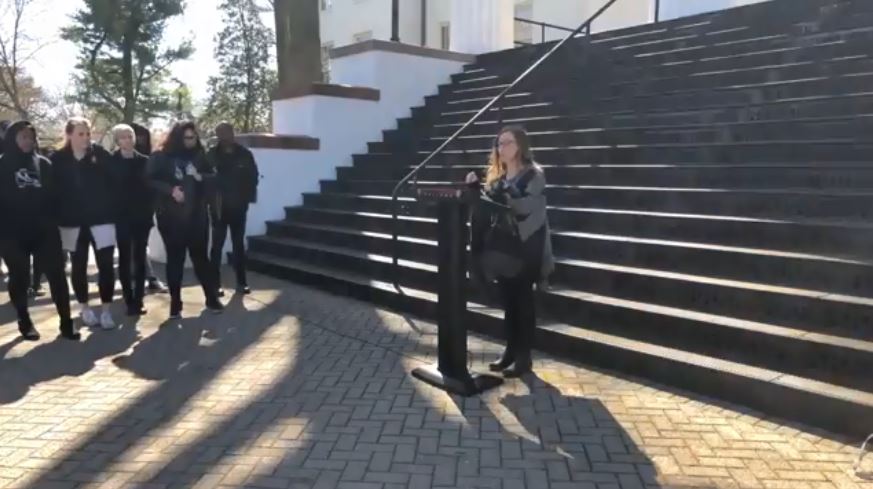Opinion: Walkout to End Gun Violence

Amanda Richman ’18 delivers a speech at the Walkout to End Gun Violence on April 20, 2018 (Photo via Screengrab from The Gettysburgian’s livestream)
By Amanda Richman, Guest Columnist
Last Friday, I delivered a speech about how guns claim lives in mass shootings, suicides, at the hands of police, and by intimate partners. But on Sunday there was another shooting in a Waffle House in Nashville. And 24 people were shot in Chicago this weekend, four of them fatally. And earlier this month, the police fired 30 rounds that killed Diante Yarber in a Walmart Parking Lot.
In the speech, I reflected on the 12,979 people who were fatally shot in 2015 while the country was busy debating the right to bear arms. This weekend I saw the evidence that while we continue to have debates and discussions and protests about guns in the United States, people continue to die. Our country has a serious problem with guns that we need to stop denying. We need to reject the notion that guns don’t kill people, people kill people because the real issue is that guns facilitate the efficient killing of people. This is the equivalent of saying that cigarettes don’t cause lung cancer, smokers cause lung cancer. Well, yes; however, cigarettes are tools that have been definitively linked to the development of lung cancer.
Meanwhile, guns are tools used to kill 58 people in 15 minutes. In fact, the largest difference between guns and cigarettes is that a large body of scientific evidence exists on tobacco, while we know shockingly little about how and why guns are used and obtained because our government has blocked funding from this important public health concern.
So many questions exist around the use of guns in America. How do people obtain illegal firearms? What are the risk factors for committing a mass shooting? How can we train police to diffuse situations without use of a firearm or to correct implicit and systemic biases against racial minorities?
The walkout on Friday confronted many issues that we as a nation have difficulty discussing: police brutality, the diminished attention paid to the role of gun violence in communities of color that are disproportionately affected, and violence against women, particularly in intimate partnerships. These issues were so sensitive that a Gettysburg Times article on the walkout barely mentioned them. Yet, a white man can kill four people and be handled by the police with less force than an unarmed black woman. And he can also be described as a “good kid” and not a “car theft suspect” whose death is barely covered in the national media. If nothing else, I hope the walkout sparked conversations about these underlying systems of oppression that contribute to the persistence of gun violence in our country and will help students think deeply about the intersection of these issues that make gun violence such a difficult problem to solve.
Those who are not actively fighting violent systems of oppression are complicit in perpetuating violence. Similarly, those who delay action on gun control are complicit in allowing mass shootings and everyday violence to continue. I urge you to educate yourselves, continue debating these issues, and reach out to your state and local representatives and ask them to do the same. There is a lot you can do at Gettysburg to contribute to the national conversation on gun violence, as well. If you’re writing a paper, consider researching policy interventions on gun violence in marginalized communities or the psychological reasons people commit murder or even look into the history of gun legislation in America. As students we have the privilege to educate ourselves on topics that matter, and if you care about the value of human life, then gun violence is a topic that should matter.
I was inspired that so many Gettysburg students were so passionate about protesting gun violence that they walked out of their classes on Friday, but I hope this walkout was not the end of the conversation, but an impetus to create change.
